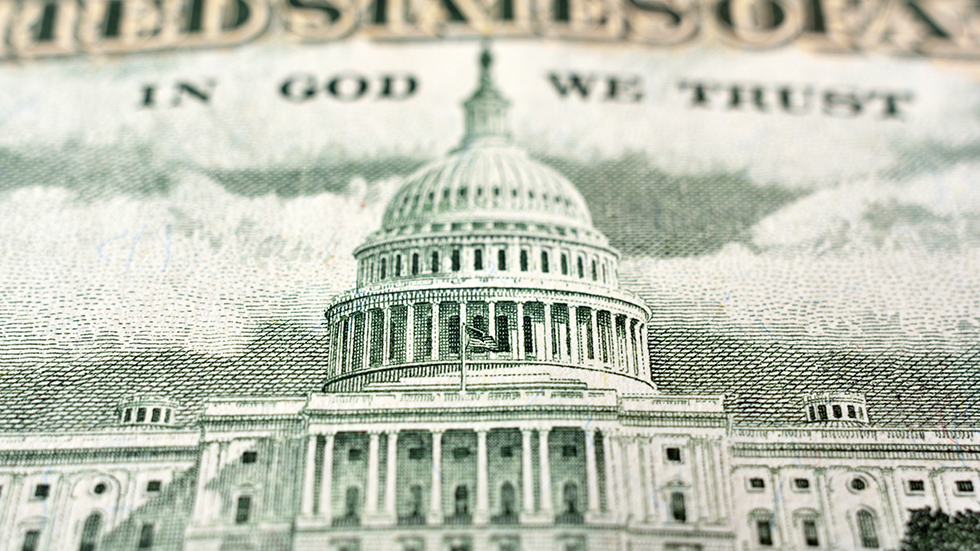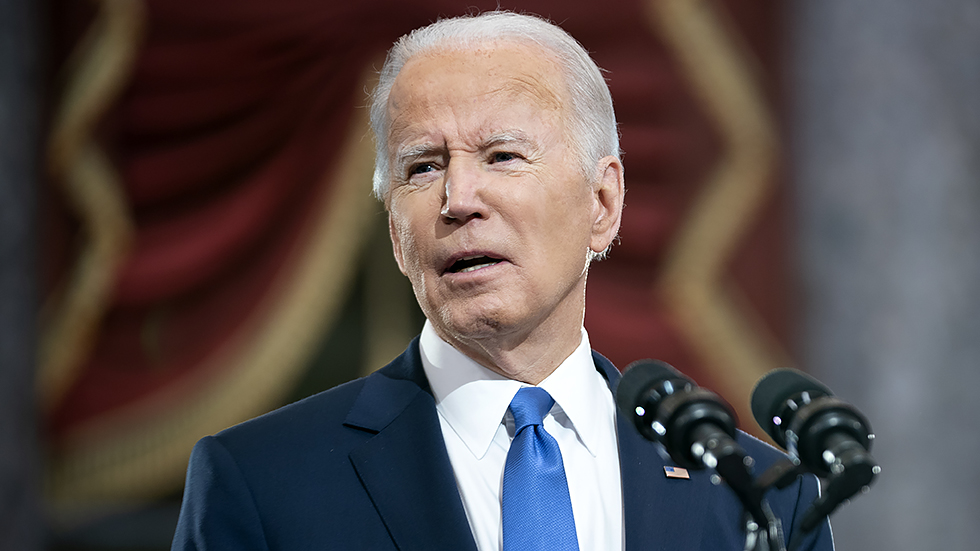On The Money — Economy had post-recession growth in 2021
Happy Thursday and welcome to On The Money, your nightly guide to everything affecting your bills, bank account and bottom line. Subscribe here: digital-staging.thehill.com/newsletter-signup.
Today’s Big Deal: The U.S. economy bounced back quite strongly from the coronavirus pandemic emerging in 2020. We’ll also look at a decline in jobless claims and new life for the expanded child tax credit?
But first, find out why climate change is good for avocados but bad for cereal.
For The Hill, we’re Sylvan Lane, Aris Folley and Karl Evers-Hillstrom. Reach us at slane@digital-staging.thehill.com or @SylvanLane, afolley@digital-staging.thehill.com or @ArisFolley and kevers@digital-staging.thehill.com or @KarlMEvers.
Let’s get to it.
US economy grew 5.7 percent in 2021

The U.S. economy grew by almost 6 percent in 2021 as the country staged a rapid rebound from the blow of the coronavirus pandemic, according to data released Thursday by the Commerce Department.
U.S. gross domestic product grew 5.7 percent last year after falling 3.4 percent in 2020 as the onset of COVID-19 derailed the global economy and wiped out 21 million domestic jobs, according to the Bureau of Economic Analysis.
Growth also accelerated during the last quarter of the year, hitting an annualized pace of 6.9 percent even as high inflation strained consumers and businesses. That means the U.S. economy would have grown almost 7 percent if the fourth-quarter pace of growth lasted an entire year.
- Economists credit the combination of unprecedented fiscal and monetary aid and the quick development of COVID-19 vaccines for the economy’s swift bounceback from the steepest decline since the Great Depression.
- The U.S. had recovered all but roughly 600,000 of the jobs lost to the onset of the pandemic by December, wage growth accelerated sharply, and consumer spending ran well above pre-pandemic levels.
- Much of the fourth-quarter surge in GDP came from a jump in inventory investment by businesses, a potential sign of progress toward unsnarling supply chains.
Sylvan breaks down the GDP jump here.
CTC STILL IN PLAY
Top House Democrat open to lower income caps for child tax credit to win over Manchin
House Majority Whip James Clyburn (D-S.C.) expressed openness to lowering the income limits for families to access the expanded child tax credit if it helps win Sen. Joe Manchin’s (D-W.Va.) support for the party’s sweeping climate and social spending bill.
Clyburn said in an interview with The Washington Post on Thursday that he thinks Democrats still have wiggle room with getting Manchin on board with a party-backed expansion to the child tax credit after its recent lapse.
“He wanted to see it means-tested. I’m not opposed to that,” Clyburn said, adding he would like to see Manchin “come forward with a bill for the child tax credit that’s means-tested.”
- Manchin on Thursday signaled he is still open to participate in negotiations around the spending plan and the expanded child tax credit, but added he thinks “means testing” will ensure it is more targeted to those most in need.
- The West Virginia senator has lambasted the current expanded child tax credit that is eligible to families making up to $400,000 annually.
- Lowering the income eligibility cap would reduce the total cost of the Build Back Better package, another key priority for Manchin.
Aris has more on Clyburn’s comments here.
JOBLESS CLAIMS DOWN
New jobless claims drop to 260K after weeks of increases
New applications for jobless aid fell sharply by 30,000 last week after several weeks of increases, according to data released Thursday by the Labor Department.
- In the week ending Jan. 21, seasonally adjusted new claims for unemployment insurance totaled 260,000, falling from the previous week’s revised level of 286,000.
- The four-week moving average of claims rose by 15,000 to 247,000.
After falling below pre-pandemic levels in November, jobless claims rose steadily through January as the omicron variant drove a record-breaking spike in COVID-19 cases. Roughly 12 million Americans missed work at the beginning of January because either they or a loved one they cared for contracted COVID-19, according to Census Bureau data released last week.
“The first decline so far this year in seasonally adjusted new jobless claims is a welcome sign after three consecutive gains,” wrote Mark Hamrick, senior economic analyst at Bankrate, in a Thursday analysis
Sylvan breaks it down here.
UNDER PRESSURE
Congressional Progressive Caucus (CPC) leaders are urging the Democrat-controlled Senate to pass President Biden’s Build Back Better package by March 1, saying the timing would give him a much-needed opportunity to announce a major accomplishment during his State of the Union address.
“In the months since negotiations around the Build Back Better Act stalled, the case for this legislation has only become more urgent,” said Rep. Pramila Jayapal (D-Wash.), who chairs the group of liberal lawmakers on Capitol Hill, wrote in the Thursday statement.
Jayapal listed several issues that have escalated recently that are hurting Americans and explained how Biden has a chance to tell voters that he worked with congressional Democrats to fix some of what has been broken.
- The CPC has been a leading force at the negotiating table during months of lapsed deadlines to pass the massive spending package.
- Progressive officeholders have consistently urged two centrist holdouts in the upper chamber, Sens. Joe Manchin (D-W.Va.) and Krysten Sinema (D-Ariz.), to get on board with the rest of the Senate Democratic caucus and majority of House Democrats to pass the president’s signature first-term proposal to expand the social safety net and protect the environment.
The Hill’s Hanna Trudo has more here.
Good to Know
 A new poll of voters in six potential swing states and states with senators up for reelection in November found that a majority of voters are worried about how President Biden’s signature spending proposal might worsen rising prices.
A new poll of voters in six potential swing states and states with senators up for reelection in November found that a majority of voters are worried about how President Biden’s signature spending proposal might worsen rising prices. The survey, which was commissioned by the National Association of Wholesaler-Distributors, a business group that is lobbying lawmakers to abandon the bill, found that 57 percent of respondents believe Build Back Better, when described as a multi trillion-dollar spending package, will worsen inflation.
Here’s what else we have our eye on:
- A federal judge dismissed a multi-district lawsuit this week that was filed against the online trading platform Robinhood for restricting trades of certain stocks in the midst of the “meme stock” short squeeze that took place last January.
- Eight Democratic members of Congress on Thursday wrote to major cryptocurrency-mining companies for information on their energy usage and its potential effects on climate change.
- A group of millionaires advocating for progressive tax policies on Thursday endorsed Rep. Lucy McBath (D-Ga.) and Democratic Texas House candidate Jessica Cisneros in their primaries.
- Facebook is selling the technology for its cryptocurrency project after the effort was met with a series of challenges.
- A judge ruled Wednesday that Amazon and Whole Foods can be sued for refusing to hire a convicted murderer who served 23 years in prison, Reuters reports.
- Tesla CEO Elon Musk offered $5,000 to a 19-year-old to shut down a Twitter account that tracks his private flights, the teenager told Protocol.
That’s it for today. Thanks for reading and check out The Hill’s Finance page for the latest news and coverage. We’ll see you Friday.
Copyright 2024 Nexstar Media Inc. All rights reserved. This material may not be published, broadcast, rewritten, or redistributed..













